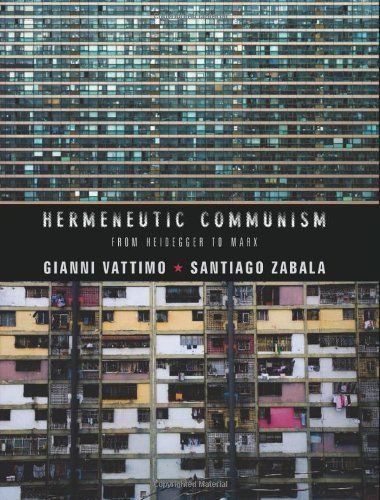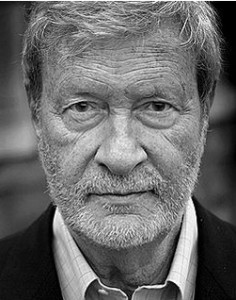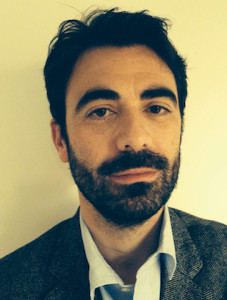Gianni Vattimo and Santiago Zabala’s Hermeneutic Communism
By Arne De Boever, Eduardo Mendieta, Imanol GalfarsoroJanuary 19, 2014

Hermeneutic Communism by Gianni Vattimo and Santiago Zabala. Columbia University Press. 264 pages.
ACCORDING TO SLAVOJ ŽIŽEK, Gianni Vattimo and Santiago Zabala’s Hermeneutic Communism “is a book that everyone who thinks about radical politics needs like the air he or she breathes!” Since its publication in 2011, Vattimo and Zabala’s text has been translated into several languages; a volume of critical essays about the book will appear next year, with contributions from Babette Babich, William Egginton, and other distinguished philosophers. Today we publish an interview with Santiago Zabala, conducted by Imanol Galfarsoro, and an essay on the book by Eduardo Mendietta.
— Arne De Boever


LARB Contributors
Arne De Boever teaches American Studies in the School of Critical Studies at the California Institute of the Arts, where he also directs the MA Aesthetics and Politics program. He is the author of States of Exception in the Contemporary Novel (2012) and Narrative Care (2013) and editor of Gilbert Simondon: Being and Technology (2012) and The Psychopathologies of Cognitive Capitalism: Vol. 1 (2013). He edits Parrhesia: A Journal of Critical Philosophy and the critical theory/philosophy section of the Los Angeles Review of Books. He is also a member of the boundary 2 collective and an Advisory Editor for the Oxford Literary Review.
Eduardo Mendieta is professor of philosophy, associate director of the Rock Ethics Institute, affiliated faculty at the School of International Affairs, and the Bioethics Program at Penn State University. He is the author of The Adventures of Transcendental Philosophy (Rowman & Littlefield, 2002) and Global Fragments: Globalizations, Latinamericanisms, and Critical Theory (SUNY Press, 2007). He is also co-editor with Jonathan VanAntwerpen of The Power of Religion in the Public Sphere (Columbia University Press, 2011), and with Craig Calhoun and Jonathan VanAntwerpen of Habermas and Religion (Polity, 2013), and with Amy Allen, From Alienation to Forms of Life: The Critical Theory of Rahel Jaeggi (Penn State University Press, 2018), The Cambridge Habermas Lexicon (Cambridge University Press, 2019), and Justification and Emancipation: The Critical Theory of Rainer Forst (Penn State University Press, 2019). He is the 2017 the recipient of the Frantz Fanon Outstanding Achievements Award.
Imanol Galfarsoro was educated in French, British, and American universities. Obtained his PhD from the University of Leeds (Sociology and Social Policy). Takes active part in cross-disciplinary international research networks conducting academic studies on questions of multiculturalism, identity politics, and diversity. Also involved in a number of grassroots intellectual projects reflecting his interest in the intersection of critical social theory and political philosophy with post- and de-colonial studies. Has published several books and a considerable amount of articles, collaborations in collective publications, and introductions to books in Basque, English, and Spanish.
LARB Staff Recommendations
Rebel with a Cause: An Interview with Carne Ross
In this exclusive interview, Carne Ross, former British diplomat and current advisor to the United Nations for the National Coalition of Syrian...
Feminism, the Frankfurt School, and Nancy Fraser
Nancy Fraser and her “historic task”: bringing feminism to the Frankfort School.
Did you know LARB is a reader-supported nonprofit?
LARB publishes daily without a paywall as part of our mission to make rigorous, incisive, and engaging writing on every aspect of literature, culture, and the arts freely accessible to the public. Help us continue this work with your tax-deductible donation today!